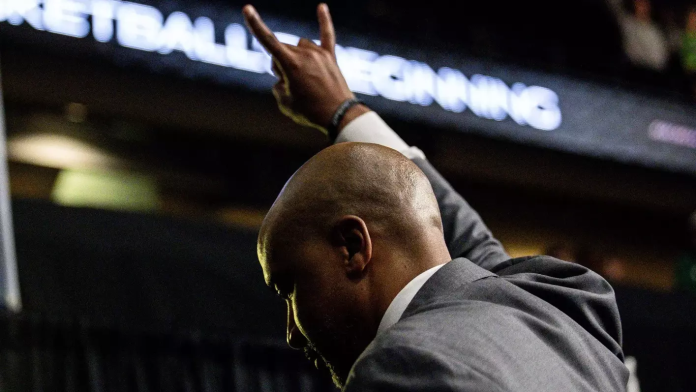Joey Johnston
Athletics Senior Writer – FOR ALL THE BEST IN ALL THINGS USF BULLS SPORTS GO TO -www.gousfbulls.com
This story was reprinted from the USF WEBSITE
Amir Abdur-Rahim Memorial Page
Our world has been rocked.
It goes far beyond Thursday’s tragedy, the sudden, senseless death of a vibrant, life-affirming 43-year-old man, who leaves behind a wife and three small children.
It’s more significant than the loss of a rising-star coach who immediately unlocked the long-simmering potential of the USF men’s basketball program, magically creating a joy-filled championship season. Meanwhile, he unabashedly planted himself in the middle of the party, dancing without reservation, conducting the pep band, shaking hands, hugging, having the time of his life. He didn’t want to leave the Yuengling Center. And we never wanted it to end.
What did the man keep saying?
This ain’t the same old South Florida, my brotha!
Amir Abdur-Rahim was a giver. And his true gift was connection. That’s what made him far more than a basketball coach. In one year, he became the face of an entire campus, everyone’s friend, a symbol of all that was right at USF — and all it could become. He was the Pied Piper of a movement, a renewal of school spirit, an affirmation that the Bulls could play on the biggest stage, while having a blast in the process.
“From the moment we met him, he was always completely authentic,” USF vice president of athletics Michael Kelly said.
“His ability to bring people together — whether it’s students, program supporters, faculty, staff and the local community — is absolutely elite,” USF senior associate athletic director Lee Butler said last season.

You called him a coach.
He called himself a molder of young men.
He wouldn’t tolerate entitlement from his players, requiring them to carry their own bags off the bus during road trips and making sure they cleared their own dinner plates after hotel team meals, often puzzling the overworked service staffers so accustomed to cleaning up after others.
He insisted that his players take out their headphones while walking the USF campus. Shake somebody’s hand, he said. Invite them to a game. Get to know them. Don’t be in such a hurry. Hold open a door and smile.
“I don’t want our program to be separated from campus,” Abdur-Rahim once said. “We are a part of campus. We want to be visible. I think it’s good for the students to have a head basketball coach who is a human being.”
“I’d run through a wall for Coach Amir,” USF’s Jed Castricone said.
Bulls player?
No, just a senior majoring in finance, sitting in the end zone with the rest of his SoFlo Rodeo buddies, who felt the same way.
Whether you were USF president Rhea Law, a national media member, a student reporter, a CEO, a maintenance worker or an awkward freshman, Abdur-Rahim was available and approachable.
He presented Valentine’s Day flowers to women who worked behind the scenes in USF’s athletic department. He showed up at campus spots to buy coffee, donuts or pizza for students. He sometimes woke up his children by whistling Bobby McFerrin’s “Don’t Worry Be Happy.” He remembered names. He looked you in the eye.
“Amir is that person,” said Ari, his wife of 13 years, last season when asked about her husband’s ever-optimistic temperament. “He still enjoys the beauty of every single moment.”
They met by chance at a Fourth of July party in Atlanta and wound up together that night at a Waffle House, where they talked for hours. Four months later, before Abdur-Rahim’s family (he’s the fourth-oldest of 13 siblings) at a Thanksgiving dinner, he dropped to one knee and asked for her hand in marriage.
As a mostly risk-averse attorney, a four-month whirlwind courtship wasn’t in her plans. But, of course, she said yes. And that was because of a quality she noticed almost immediately.
“When we met, the first thing I noticed was Amir’s heart,” she said. “Just a great, kind heart.”

Here’s a Coach Amir story:
Before last season’s opener, he was extremely hard on his players all week in practice. No one could do anything right, it seemed. It was the beginning of what many players described as a relationship that could be challenging at times, but one that always pushed them to a greater purpose.
In the locker room before heading to the court, USF assistants did all the game-plan talking. Abdur-Rahim stood in the doorway, expressionless, biding his time.
Then he went to each locker and talked individually with each of the 15 players. He built them up, reminding them of the qualities they could bring to the team. He said something personal, something he loved about each one.
The fired-up players charged to the game floor. The Bulls won by 44 points. Abdur-Rahim mostly watched the proceedings, arms folded, never raising his voice.
“He’s more than a coach,” said USF’s Kasen Jennings, who followed Abdur-Rahim to Tampa from Kennesaw State. “He’s making us better people. I feel that’s very unusual. He makes sure we’re living right. He’s a father figure and a big brother. He’s all of that. There’s nobody like him.”
“When I watched the Bulls play, I’ve seen excellent execution in pressure situations,” said respected basketball voice Mike DeCourcy, a columnist with The Sporting News and analyst with the Big Ten Network, late last season. “That’s the sign of a program that’s connected with its coach and connected with one another.”
“I have to pinch myself to make sure I’m alive and all of this is real,” said longtime prominent USF booster Les Muma last season. “We’ve got one hell of a coach. We’ve got a bunch of players who have gelled together as a team. And now we’ve got a game-day atmosphere that’s as good as any in the country. We’re floating on a cloud right now.”

It wasn’t always that way.
Six games into the season, the Bulls were 2-4 and shooting a woeful 24-percent from 3-point range. Abdur-Rahim, the new guy who was producing the same old results, was asked if the Bulls should back away from a perimeter game.
“The shots will fall,” he said.
And that day, against heavily favored Florida State, the shots began falling as the Bulls pulled the upset. In fact, from that point until season’s end, the Bulls shot 42-percent from 3-point range, a figure that would’ve led the nation for an entire season.
“God blessed a lot of us with sight,” Abdur-Rahim said last season. “But not everyone has vision. Stevie Wonder had vision. He had an idea of who he wanted to be and the type of music he wanted to make. That had nothing to do with his inability to see. It had everything to do with his vision.”
The coach saw things that weren’t there — yet.
He believed in his system. He believed in his people. And his faith never wavered.
“To God be the glory,” he said to begin every post-game interview.
As the son of a Muslim father and a Christian mother, Abdur-Rahim was raised on faith, usually working Thanksgiving mornings at Atlanta food banks or homeless shelters. He remembered regularly visiting the classroom of his mother, a high-school teacher, to interact with special-needs students.
His family was hyper-competitive and athletic, but always hard-working. His older brother, Shareef, became third pick in the 1996 NBA Draft and earned an Olympic gold medal while signing professional contracts with $200-million. Still, as his post-basketball life began, he took an unpaid internship.
The foundation remains firm.
“From God, we come, and to God, we must all return,” Shareef Abdur-Rahim wrote in a social media post that also thanked people for their concern over his brother’s death.
Perspective.

Although named AAC Coach of the Year following a 25-8 record, program-best 15-game winning streak and American Athletic Conference regular-season championship, Abdur-Rahim quickly diverted the conversation when he was praised.
“Don’t congratulate me for doing what I was hired to do,” he said. “The results take care of themselves if you’re playing and fighting for one another every night. It’s more powerful than confidence and momentum. Connection, man. That’s what we want. That’s who we are.”
Last season was going to be the start. Amir Abdur-Rahim‘s story wasn’t supposed to end this way — and certainly not this soon. If words could cure heartache or rationalize a tragedy, we’d fill page after page.
Instead, the numbness and disbelief has given way to sobering reality.
Once the shock wears off, what will you remember? Once it shifts from unspeakable sadness to acceptance to soldiering on with life, what lessons will stick?
Life always moves on eventually. The Bulls will get back to playing and winning. One day, another coach will raise a trophy and take USF back to the NCAA Tournament.
But it won’t be the same old South Florida we knew under Coach Amir. It can’t be.
It’s no coincidence that the news resonated with so many people. There’s a reason why there was a pilgrimage to the Bull statue outside the Yuengling Center, where fans and supporters left flowers, beads, photos, USF caps and SoFlo Rodeo T-shirts.
He was like a shooting star that lit up the night, giving us something to share and rally around, something to marvel at, something that pridefully brought us together for a common goal.
And after rocking our world forever, after giving us so much joy, after teaching us how to live a purpose-filled life, after providing a season’s worth of memories that will never be taken away, he was gone.







